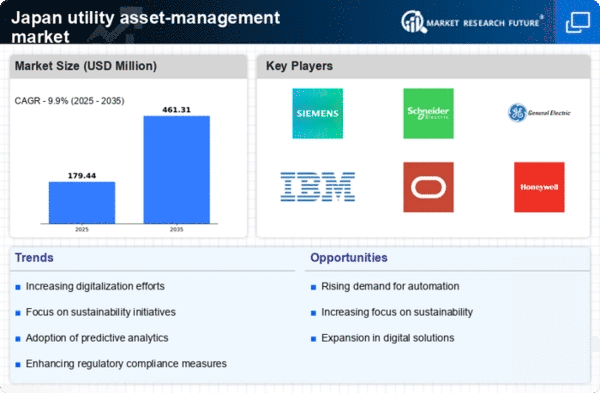Increased Demand for Renewable Energy
The shift towards renewable energy sources is reshaping the utility asset-management market in Japan. As the country aims to increase its renewable energy share to 36-38% by 2030, utilities must adapt their asset management strategies to accommodate this transition. This includes integrating renewable energy sources into existing grids and managing the variability associated with them. The investment in smart grid technologies and energy storage solutions is projected to reach $10 billion by 2027, indicating a robust market response to the demand for cleaner energy. This transition not only enhances sustainability but also drives innovation in asset management practices.
Aging Infrastructure and Maintenance Needs
Japan's utility asset-management market is significantly influenced by the aging infrastructure of its energy and water systems. Many assets are reaching the end of their operational life, necessitating urgent upgrades and maintenance. The government estimates that approximately 30% of utility assets are over 30 years old, which poses risks to service reliability and safety. Consequently, utilities are compelled to invest in asset management solutions that prioritize maintenance and replacement strategies. This focus on infrastructure renewal is expected to drive market growth, as utilities seek to mitigate risks associated with aging assets and ensure compliance with safety standards.
Technological Advancements in Asset Management
The utility asset-management market in Japan is experiencing a notable shift due to rapid technological advancements. Innovations such as IoT, AI, and big data analytics are enhancing the efficiency of asset management processes. These technologies enable utilities to monitor assets in real-time, predict failures, and optimize maintenance schedules. As a result, operational costs are reduced, and service reliability is improved. According to recent data, the adoption of these technologies could lead to a 20% increase in operational efficiency within the next five years. This trend indicates a growing reliance on technology to manage utility assets effectively, thereby driving the market forward.
Government Initiatives and Funding Opportunities
Government initiatives play a pivotal role in shaping the utility asset-management market in Japan. Various funding programs and incentives are being introduced to support utilities in upgrading their asset management practices. The government has allocated approximately $5 billion for infrastructure improvements and technology adoption in the utility sector over the next five years. These initiatives aim to enhance operational efficiency, promote sustainability, and ensure compliance with regulatory standards. As utilities leverage these funding opportunities, the market is likely to witness accelerated growth, driven by enhanced asset management capabilities.
Enhanced Customer Engagement and Service Delivery
In the utility asset-management market, customer engagement is becoming increasingly critical. Utilities in Japan are recognizing the importance of providing enhanced service delivery to meet customer expectations. This includes offering real-time data access, personalized services, and improved communication channels. As customer satisfaction becomes a key performance indicator, utilities are investing in advanced asset management systems that facilitate better service delivery. Reports suggest that utilities that prioritize customer engagement can see a 15% increase in customer retention rates. This trend indicates a shift towards a more customer-centric approach in asset management.
















